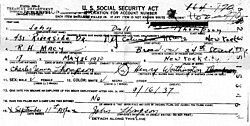
Public records are documents or other records that are not confidential, and generally have been filed with a public agency. Public records can include everything from vital records, meeting minutes and notices, to lists of people. In genealogy, researchers are looking for public records with names and other identifying information that place a person in a location.
For genealogical research, the following information, and much more, can be found in public records:
- Name
- Age
- Mailing Address
- Phone Number
- Occupation
- Family Members
- Household Members
- Education
The details found within a public record depends on the purpose of that record. For example, a county government grantor/grantee database will include the name and address of those who have bought and sold property and the address of the property itself. In contrast, a real estate license database will include name, address, license number, and license type.
Public records are largely databases or indexes and may not contain all of the information available on the original record. As such, they should be verified using other records.
Research your ancestors on MyHeritage
Types of public recordsTypes of public records

Public records include those created and maintained by a government or private entities. Their content and availability differ depending on federal and local law. Records that are available will not contain confidential information, and the rules pertaining to confidentiality vary by entity or agency. For example, public records available in one state or country may not be available in another due to privacy concerns.
These records can include, but are not limited to, the following:
- Telephone directories
- Property tax assessments
- Occupational directories
- Voter registration lists
- Grantor/grantee lists
- Business licenses
- Occupational licenses (real estate, cosmetology)
- Department of Motor Vehicle licenses
- Social Security applications
- State Unclaimed Property lists
- Criminal history
Public records are largely created and maintained by the government, but genealogy databases can include records from non-government entities such as a phone company. Genealogy public record collections may also contain databases that combine multiple types of public records.
Where to find public recordsWhere to find public records
Not all public records are easy to find. There is no one repository for all public records. Relevant databases for your research will be found in numerous places, some of which are not "genealogy websites."
Start your search on genealogy websites. Public record collections will include telephone books, voter lists, property tax, and other databases. When researching these databases, take note of the year this information was acquired. It may be decades old. Keep in mind that many of these types of databases are indexes and do not contain the original records. Information in these databases is compiled and abstracted and may not provide enough information for you to ascertain two similarly named people.
One type of online website to search is "people finder" websites. These websites provide information based on public records. Numerous websites offer this service. You may find one of these websites in your list of search engine results when searching by a name. These websites can include alias names, mailing address, age, phone number, occupation, and names of family members and neighbors. They may include more detailed information, like the history of residences or criminal records, for a fee. Keep in mind that the information may not be accurate.
Another place to search for public records is city, county, or state government agencies. Websites for recorders/assessors offices, the Department of Real Estate, the Board of Barbering and Cosmetology, and the State Controller's Office (to name a few) may reveal relevant records, databases, and indexes. For example, a county recorder's office may have an online grantor/grantee index that can be searched by name. Once you find relevant hits, you could visit the office for copies of the deeds.
A search on a person's name in a general search engine such as Google may also reveal the public record indexes in which the person appears.
Why use public records?Why use public records?
Public Records can provide information which can help place a person in a specific location at a specific time. This can help when researching family members who are deceased, as well as finding living family members.
While genealogists focus on researching long-dead ancestors, finding living relatives serves multiple purposes. Contacting living relatives can help find answers to genealogical questions. For those needing an additional family member to take a DNA test, finding lists of living relatives can help.
Genealogy tip: Use public records to create a timeline for the person you are researching. This chronological listing can help you understand when and where they lived.
See alsoSee also
Explore more about public recordsExplore more about public records
- MyHeritage Public records collection at MyHeritage
- City Directories: No Town Too Small No Clue Too Little at MyHeritage Knowledge Base
- Genealogy Research for Beginners: How to Get Started on the MyHeritage blog
- Genealogy for Beginners: Start Your Online Family Tree on the MyHeritage Knowledge Base
- Vital Records at National Archives
- Military Records at USAGov
- Which records are included in the MyHeritage historical records search engine? on the MyHeritage Help Center
- How do I use the MyHeritage historical records search engine? on the MyHeritage Help Center
- How can I get better search results in the MyHeritage historical records search engine? on the MyHeritage Help Center

